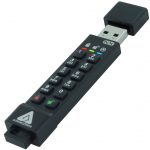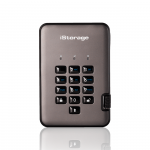Emsisoft Decrypter for Planetary gets your ransomware-riddled files back for free

Emsisoft has released a free decrypter tool for anyone who has been struck by the Planetary Ransomware, eliminating the need to pay a fee to the attackers.
Before using the tool you are advised to ensure that you have removed the malware from your computer -- something you can do with the free version of Emsisoft Anti-Malware. You also need to ensure that you don't delete the ransom note ("!!!READ_IT!!!.txt") or the decrypter won't work.
FinalCrypt 4.0.3 adds uncrackable encryption to your most sensitive files

The battle to encrypt data securely rages on, with developments in quantum computing mirrored by hackers’ ever more creative attempts to break encryption. Ironically, one form of encryption resistant to all forms of hacking -- One Time Pad (OTP) -- dates from the 19th century.
Symmetric OTP works by generating encryption from a key file -- the larger the better -- which renders all attempts to decrypt the data useless without access to said key file. And FinalCrypt, available for Windows, Mac and Linux -- indeed any Java-capable computer can run the tool, brings the technology to any computer user.
Encryption backdoors raise the likelihood of attack

Countries with government-mandated encryption backdoors are more susceptible to nation-state attacks according to 73 percent of security professionals.
A survey from machine identity protection company Venafi also finds 69 percent believe countries with encryption backdoors suffer economic disadvantages in the global marketplace as a result.
Airline e-ticketing systems put passenger data at risk

Airlines could be putting the personal data of their passengers at risk by using unencrypted links, according to a new report.
Researchers at security and data management company Wandera have uncovered a vulnerability affecting a number of e-ticketing systems that could allow third parties to view, and in some cases even change, a user's flight booking details, or print their boarding passes.
Kingston unveils IronKey D300S hardware-encrypted 'serialized' USB flash drive

About two years ago, Kingston launched the IronKey D300 USB Flash Drive. This drive was extremely impressive, as it featured FIPS 140-2 Level 3 256-bit AES-XTS hardware encryption.
Today, Kingston takes the drive to another level. The D300S, as it is called, is essentially the same exact drive, but now, it has a serial number and barcode on the body. This will make it easier for a company to manage the drives, saving both money and time. It is also getting a new software keyboard for safer decryption, hopefully protecting from hidden keyloggers.
Apricorn Aegis Secure Key 3NX: An ultra-secure 256-bit AES XTS hardware-encrypted USB flash drive [Review]

Storing files in the cloud means they are easily accessible from anywhere, but if you have private data that you can’t afford to fall into the wrong hands, this might not be the best option for you, especially given the number of data breaches we see on a regular basis.
An alternative option is to carry those files with you on a USB flash drive, protecting them with encryption. While software encryption methods are better than nothing, a hardware encrypted solution, like the Aegis Secure Key 3NX, is a much more advisable choice.
Apricorn unveils Aegis Secure Key 3NX 256-bit AES XTS hardware-encrypted USB drive

Storing files in the cloud is very convenient, but understandably, if they contain extremely sensitive information -- such as trade secrets -- you may not want to transmit them over the internet. For this, locally stored data is probably a better move. Of course, if possible, you should encrypt the storage drive. Encryption may even be required as a result of new laws and regulations such as California's Consumer Privacy Act and GDPR.
Software-based encryption for storage drives is better than nothing, but hardware-based is obviously superior. Apricorn has been producing hardware-encrypted USB drives for a while now, and they are very well respected. Today, the company unveils its latest such drive. Called "Aegis Secure Key 3NX," it uses 256-bit AES XTS hardware-encryption -- FIPS 140-2 Level 3 validation is pending. The successor to the well-received Secure Key 3z features a convenient keypad, making it easy to lock and unlock when needed.
Win a 2TB diskAshur PRO2 hardware encrypted hard drive #BetaNews20

Throughout June, to celebrate BetaNews’ 20th birthday, we have been giving away some incredible prizes and while the month is drawing to a close now, we still have more giveaways for you enter.
The diskAshur Pro 2 range of portable USB hard drives from iStorage makes it easy to keep your personal files and folders private thanks to the integrated PIN authenticated XTS-AES 256-bit hardware encryption. Unlocking the drive is just a matter of tapping your PIN into the keypad and pressing the unlock button. To secure it again, just press the lock button, or eject the drive.
Cisco Talos releases free decryptor for Thanatos ransomware -- ThanatosDecryptor

Getting hit by a ransomware attack is bad enough; it means that your files have been encrypted and you'll be asked to pay a fee in a cryptocurrency such as Bitcoin or Ethereum to unlock them. The problem is that paying the ransom is in no way a guarantee that your files will be decrypted -- the ransomware was created by criminals, after all.
If you've been struck by the Thanatos ransomware, however, there's good news from Cisco Talos. The company has analyzed the malware and developed a free decryption tool that will enable you to get your files back without having to part with any money.
Cloud use and compliance drive enterprise encryption strategy

The need to protect sensitive data against cyber criminals, address complex compliance requirements, and guard against human error is driving enterprises to adopt encryption.
A new study by cyber security company Thales eSecurity, based on research by the Ponemon Institute, shows that 43 percent of respondents report that their organization has an encryption strategy applied consistently across their enterprise.
Almost half of US healthcare organizations breached in the past year

A new report from information security specialist Thales e-Security reveals that 48 percent of US healthcare organizations reported getting breached in the last year, more than 2.5 times the rate from two years ago.
In addition 56 percent report feeling either 'very' or 'extremely' vulnerable to data breaches. More than three-quarters (77 percent) reported at least one breach at some time in the past. This is the highest percentage among all US vertical industries polled in this year’s report.
Cisco solution prevents malware from hiding in encrypted traffic

As businesses increasingly turn to cloud solutions they rely more on encryption to protect their data. Gartner predicts by 2019, 80 percent of web traffic will be encrypted, but that leads to a problem as it can allow malware to travel undetected.
Detecting malicious content in encrypted traffic is difficult without decrypting it, forcing network operators to choose between privacy and security. A new solution from network specialist Cisco solves this conundrum by allowing traffic to be scanned without decrypting it.
Authorities serve Apple with a warrant to access the Texas shooter's iPhone SE

Following the shooting in a Texas church a couple of weeks ago, it quickly emerged that the FBI was having trouble accessing data stored on the shooter's encrypted phone. While authorities refused to disclose the make and model of the device, when Apple said that it had contacted the FBI to offer help, it all but confirmed early reports that an iPhone was at the center of the case.
Now Apple has been served with a warrant to help local law enforcement officers to access messages, photos and other data stored on gunman Devin Patrick Kelley's iPhone SE.
US government uses Texas shooter's iPhone to support its case for encryption backdoors

The inability of law enforcement agencies to access encrypted data stored on smartphones is a relatively new one, but it's one that really came into the spotlight with the San Bernardino shooting latest year. With the recent shooting in Texas, the US government is talking about the issue once again.
We've already learned that the FBI has been unable to access data stored on the shooter's phone due to the fact that it's encrypted. We also know that Apple has been in contact with the FBI to offer help -- despite having previously said there was no way it could access encrypted data. Now it seems that the US government, specifically Deputy Attorney General Rod Rosenstein, is using the case to add pressure to phone manufacturers to include backdoors.
Apple has already contacted the FBI with help to access the Texas shooter's phone

Following the shooting at the weekend in a Texan church, the FBI revealed that it was unable to access the encrypted phone belonging to the gunman, Devin Patrick Kelley. While the FBI said that it did not want to reveal any specific details of the phone, it was widely believed to be an iPhone -- and now Apple has revealed that it has already been in contact with the agency.
The iPhone-maker says that it got in touch with the FBI "immediately" to offer help in accessing the gunman's phone.
Recent Headlines
Most Commented Stories
BetaNews, your source for breaking tech news, reviews, and in-depth reporting since 1998.
© 1998-2025 BetaNews, Inc. All Rights Reserved. About Us - Privacy Policy - Cookie Policy - Sitemap.